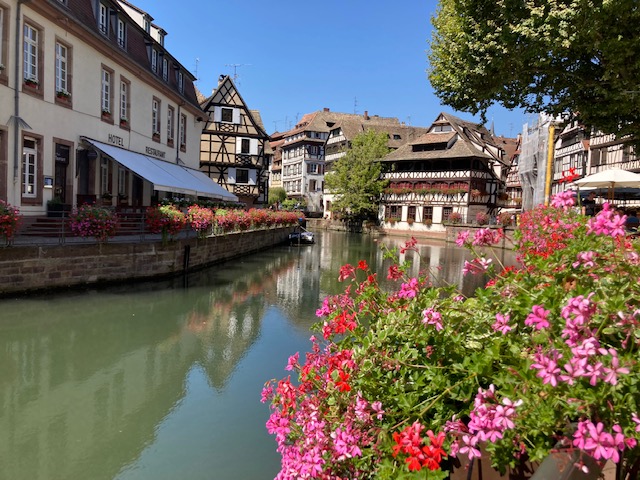Overview
Study the foundations of Democratic Institutions and Citizenship in the heart of Europe! Strasbourg is situated at the eastern border of France with Germany in the Alsace region which is home to French and German cultures. This border is formed by the Rhine, which also forms the eastern border of the modern city, facing across the river to the German town Kehl. Strasbourg is home to nearly a half million people.
Economically, Strasbourg is an important centre of manufacturing and engineering, as well as a hub of road, rail, and river transportation. The port of Strasbourg is the second-largest on the Rhine after Duisburg in Germany, and the second-largest river port in France after Paris.
Minimum GPA required by host program: Based on WU approval.
Academics
This program is open to students of any major but will be of particular interest to students studying international studies, business, political science, language and culture. The language of instruction is English. Students will also be able to avail themselves of French language classes from beginning to advanced.
The Strasbourg program is hosted by the CEPA Foundation at the European Study Center. This program is ideal for students want to focus on topics in international studies, business, political science, language and culture. The program provides housing for students in dormitory style rooms with a daily breakfast, a transportation pass and free use of laundry machines included. Program includes excursions and visits including a 3-day trip to Brussels, workshops, an academic symposium, and on-site support and 24-hour emergency assistance.
In Fall 2024, the Program Faculty Leader (PFL) with be Dr. David Gutterman, Professor of Politics, Policy, Law and Ethics (PPLE), WU. His course is entitled, "Public Space and Democracy: An Exploration of the City of Strasbourg."
Course Description: Public space is vital to a healthy democracy. It is not simply that public space offers people a place to come together. Even more, the design, use, and care for public spaces shapes the collective identity of a people, including the possibilities of collaboration and conflict, of equity, inclusion, mobility, security, and creativity present in a dynamic community. In Strasbourg we have the exceptional opportunity to explore a city that has been a pivotal European crossroads; it is home to a distinct set of intersecting identities (evident in the multiplicity of languages spoken and the architecture of the buildings). Strasbourg is at once a border city, the cultural center of the Alsatian region, and one of the four primary homes of the European Union; it represents a blend of particularism, regionalism, nationalism, and cosmopolitanism. In addition, Strasbourg has been a key point of entry for recent immigrants. In this course, Strasbourg will serve as our laboratory and case study as we explore public space, including the development of public transportation and parks, monuments and public squares, public housing and public art. We will begin with a brief history of the city and conceptual works about the city life, identity, and belonging and then move toward the development of collaborative projects in which students will engage in studies of particular aspects of the dynamic city of Strasbourg.
The program takes advantage of its proximity to the European Parliament, the European Court of Human Rights and the Council of Europe. Participants will take a combination of courses at the Center (tentative courses for 2023: EU and Contemporary European Affairs, Borders and European Integration from a Comparative European-American Perspective, Intercultural Communication) plus one course offered by the accompanying Program Faculty Leader. Students will also be able to take from a select list of 2-3 courses that align with the program from the University of Strasbourg.
Once each semester the European Study Center puts on a Symposium called Castle Talks which are an opportunity for students to get engaged in-depth with a hot topic in "European Democracy challenges." Previous topics included Migration and Covid-19, Peace and Stability in Europe, and Reconciliation in Border Regions.
In addition to academics, the program offers a comprehensive orientation program, leadership workshops, French buddy students, a career and culture seminar and survival to advanced French study opportunities.
Housing
Students live in dormitory-style housing in the "Chateau de Pourtales" in single, double and limited triple rooms and shared bathrooms. A dedicated student kitchen and lounge is available as well as outdoor courtyard seating and recreation spaces. Students are provided a free buffet breakfast daily, free laundry use, a weekly yoga class, and bicycle rentals. Some additional meals will be provided on excursions. The nearby University of Strasbourg also offers hot and cold lunch meals at subsidized rates of approximately 5 euros.
The European Study Center Château de Pourtalès is a 250-year-old fairytale castle nestled gracefully in a beautiful park just minutes from the EU institutions and the historical center of one of Europe’s most dynamic and multi-cultural cities, Strasbourg, France. The Château de Pourtalès has witnessed nearly 300 of the most compelling years in the history of Western Europe and graciously welcomed some of Europe’s most notable nobility, diplomats, dignitaries, musicians, philosophers and poets.
Dates
The Strasbourg program is available as a fall semester program. In general, the fall semester begins in late August and ends in mid-December. Anticipated Program Dates: August 27, 2023 to December 16, 2023 but subject to change.
Cost
Please see the Willamette Sponsored Programs Cost Matrix for detailed explanation of the cost of each program. If considering the program in Strasbourg talk to an OIE advisor about the French Visa application process in your advising session.
Pre-Departure Resources
- Top sites of Strasbourg
- About the European Study Center
- CEPA academic information (Since this program is Center-based, WU students will get specific from the OIE but this page gives you information you might find useful)
- CEPA Student Life and Facilities
- Starting your Campus France Application
- Understand France website - really interesting
- Local Weather
- Embassy of France: historical and government information
- CIA World Factbook
- Lonely Planet Guide


